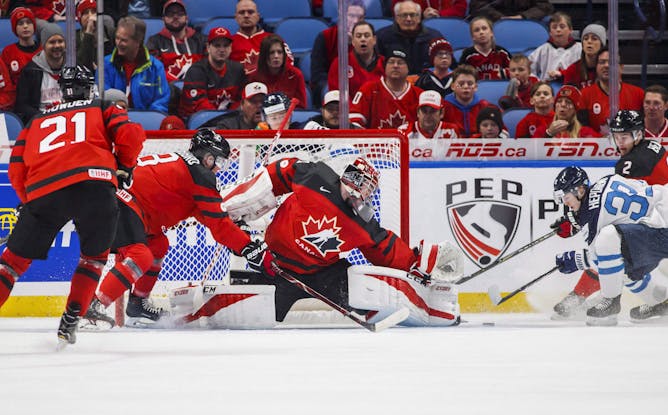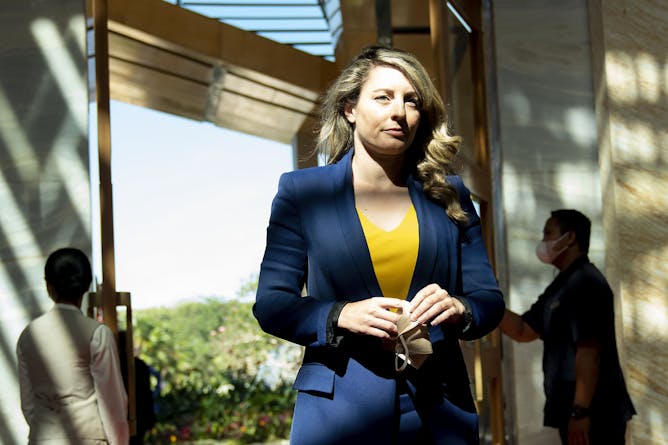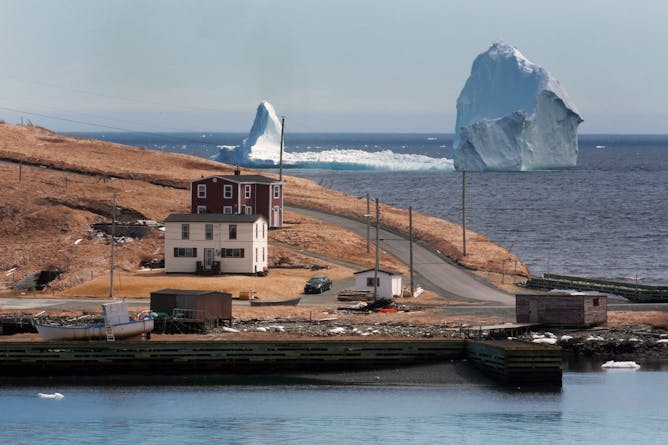|
Last week, Hockey Canada announced in an open letter that it would reopen an independent investigation into an alleged sexual assault by eight members of its 2018 world junior team.
But is Hockey Canada sincere in its quest for reform? Or has a freeze on federal funding and an exodus of major sponsors forced its hand? That’s what MacIntosh Ross of Western University asks today in The Conversation Canada.
He writes about a discernible hockey subculture that is rooted in violent performances of masculinity that is undeniably helping fuel this pattern of abuse and says that so far, organizations have been reluctant to do anything about it.
He concludes: “The Canadian hockey player can seem untouchable. Even when sexual offences are proved, it hasn’t always mattered to hockey’s decision-makers.”
Also today:
All the best,
|

Eight members of the 2018 national junior team have been accused of sexual assault.
THE CANADIAN PRESS/Mark Blinch
MacIntosh Ross, Western University
Is Hockey Canada sincere in their quest for reform? Or has a freeze on federal funding and an exodus of major sponsors forced their hand?
|

Whale art installation at the waterfront in Prince Rupert, B.C.
(Shutterstock)
Steff King, Simon Fraser University
The investigations of the deaths of three young Indigenous people in northern British Columbia had been inadequate. Justice demands fair and supportive death investigation procedures for all.
|

Many caregivers were prevented from seeing and taking care of their loved ones in long-terms care homes during the COVID-19 pandemic.
THE CANADIAN PRESS/Ryan Remiorz
Charlene Chu, University of Toronto; Vivian Stamatopoulos, Ontario Tech University
Family caregivers of residents in longterm care homes experienced a collective trauma as they were kept away from their loved ones during the pandemic. This isolation has long-ranging impacts.
|

Several factors ranging from personal spiritual beliefs to patient relationships to medical legal issues can influence whether a health-care practitioner participates in providing medical assistance in dying (MAID).
(Shutterstock)
Janine Brown, University of Regina
For people to access medical assistance in dying (MAID) requires health-care professionals willing to provide the service. The reasons health-care providers choose not to participate are important.
|

While attending the G20 summit in Bali, Indonesia, Canadian Foreign Affairs Minister Mélanie Joly announced sanctions against Russia
(Stefani Reynolds/Pool Photo via AP)
Philip Mai, Toronto Metropolitan University; Alyssa N. Saiphoo, Toronto Metropolitan University; Anatoliy Gruzd, Toronto Metropolitan University; Felipe Bonow Soares, Toronto Metropolitan University
New research shows that at least half of Canadians have encountered pro-Kremlin propaganda online and that those who hold left-leaning views are less susceptible to the Kremlin’s disinformation.
|

Un gros iceberg passe près de Ferryland, à une heure au sud de St. John’s (Terre-Neuve), en avril 2017.
LA PRESSE CANADIENNE/Paul Daly
Frédéric Cyr, Memorial University of Newfoundland
Entre zéro et 2 000 icebergs atteignent Terre-Neuve chaque printemps. Mais le réchauffement climatique pourrait mettre fin à l’Allée des icebergs.
|
Ukraine Invasion
|
-
Juris Pupcenoks, Marist College
What do Estonia, Latvia, Lithuania, Poland, Moldova and Kazakhstan have in common with Ukraine? Russian allegations that they are all overrun by Nazis.
-
Christoph Bluth, University of Bradford
Russia’s neighbours are increasingly worried about the threat of invasion.
-
Jonathan Este, The Conversation
A digest of the week’s coverage of the war against Ukraine.
|
|
COVID-19
|
-
Tony Blakely, The University of Melbourne; Michael Baker, University of Otago
Based on certain criteria, New Zealand is clearly ‘winning’. But getting policy settings right over the long haul is about more than just having the most favourable assessment on selected criteria.
|
|
Culture + Society
|
-
Madadh Richey, Brandeis University
The field of ‘monster studies’ looks at how texts reflect ideas about what’s evil, weird or scary.
|
|
Education
|
-
Max Antony-Newman, Sheffield Hallam University
Increasingly, parents are realising that flexibility is key to navigating multiple languages, and cultures, within family life.
|
|
Politics
|
-
Calvin Schermerhorn, Arizona State University
History shows that political contests over the ideological slant of the court are nothing new.
|
|